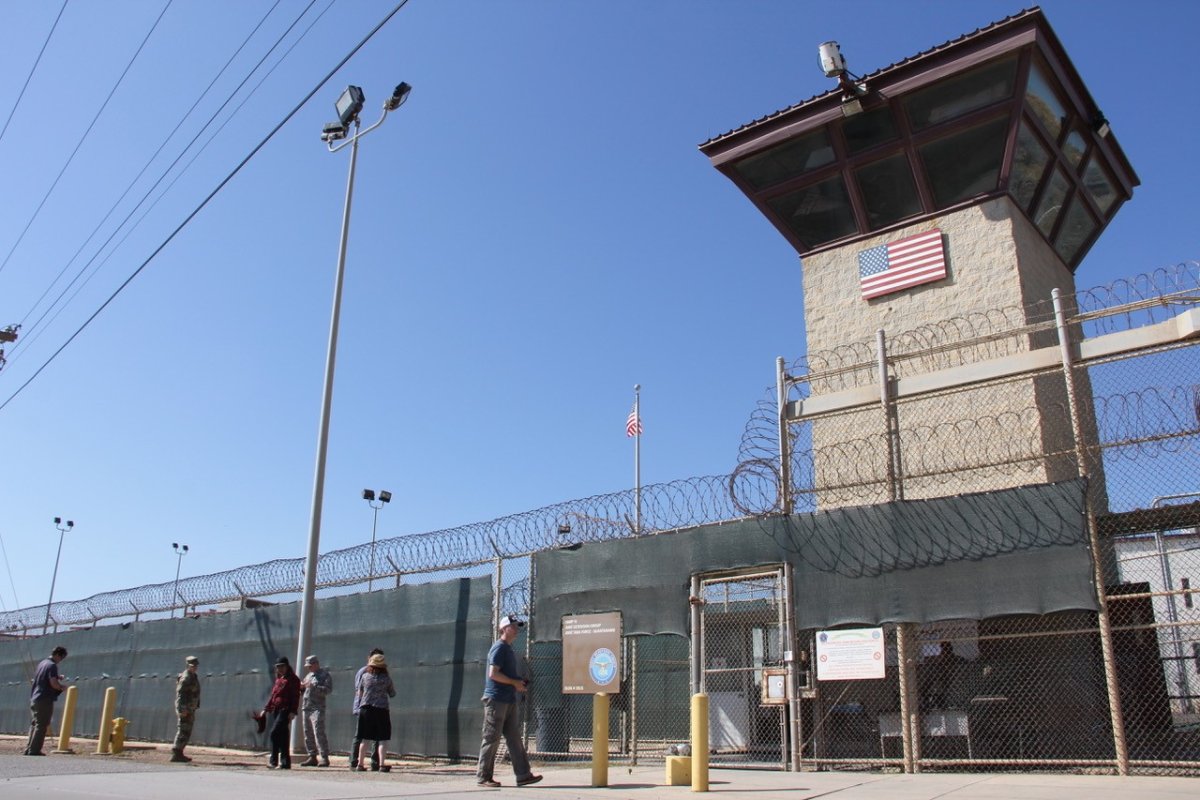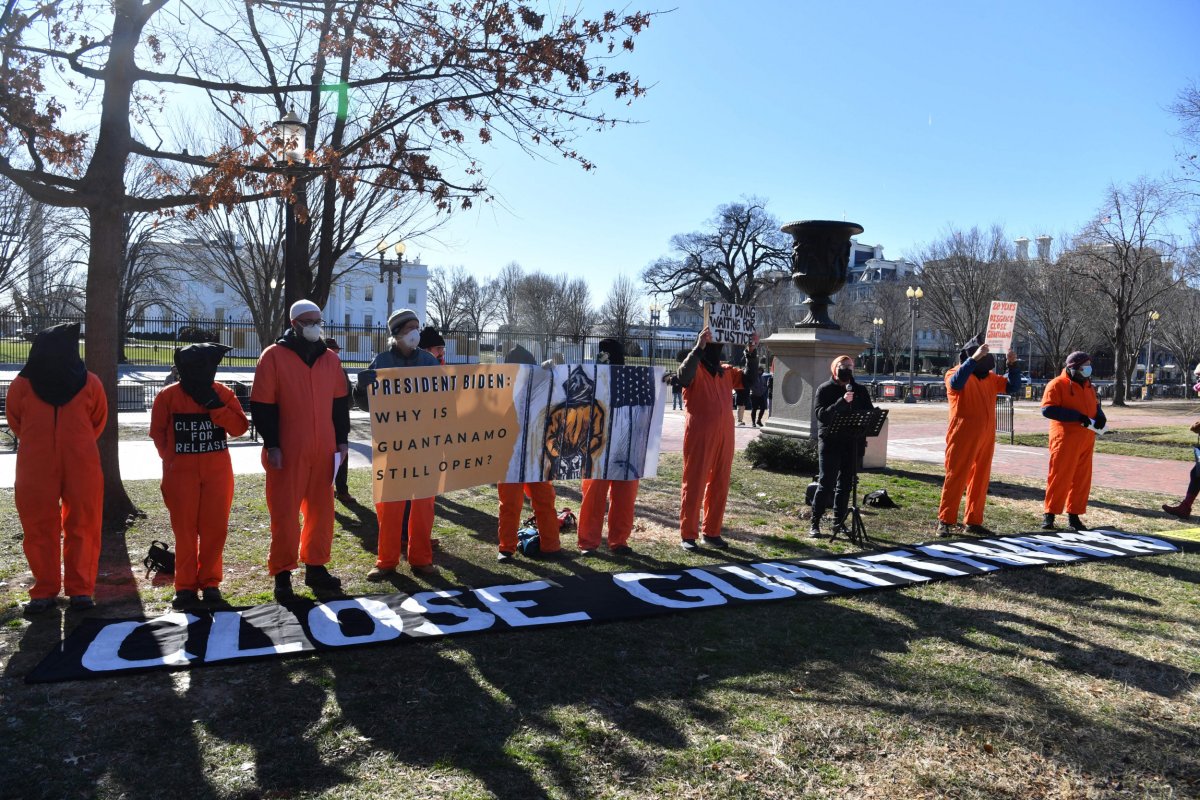Cuba officials have slammed the ongoing U.S. military presence on the shores of Guantánamo on the 20th anniversary of the opening of a controversial detainment facility there that U.N. experts and other analysts want shuttered immediately.
The prison was the target of a report published Monday featuring the opinions of a group of experts appointed by the U.N. Human Rights Council, which President Joe Biden's administration has re-engaged with as of last February. The voices featured were unanimous in their censure of the facility and seeking its closure.
"Despite forceful, repeated and unequivocal condemnation of the operation of this horrific detention and prison complex with its associated trial processes, the United States continues to detain persons many of whom have never been charged with any crime," the experts said.
They went on to describe the site as one "of unparalleled notoriety, defined by the systematic use of torture, and other cruel, inhuman or degrading treatment against hundreds of men brought to the site and deprived of their most fundamental rights."
The report was shared on Twitter Tuesday by Cuban President Miguel Díaz-Canel, who wrote, "There are already 20 years of scandalous abuses in illegally occupied Cuban territory in the bay of #Guantánamo by the biggest violators of [human rights] in the world."
Cuban Foreign Minister Bruno Rodríguez Parrilla also weighed in with criticisms accompanied by a picture from the opening of the site on January 11, 2002 of detainees in orange jumpsuits kneeling between barbed wire-wrapped fences as U.S. personnel patrolled among them.
"The US Naval Base at Guantánamo harbors a 20-year history of disgrace," Rodríguez wrote. "780 people arbitrarily detained there, without trial or due process, including minors. Not a few of them are victims of torture and degrading treatment that violates human rights."
"End that heinous jail," he added.

The U.S. first took control of territory located in Cuba's Guantánamo Bay as part of the 1903 Platt Amendment that gave Washington a lasting hand in Havana's affairs after the Spanish-American War, but the measure was repealed in 1934. Relations between the two countries collapsed entirely after the 1959 revolution that brought Fidel Castro to power, but U.S. forces remained despite protests from the new Communist rulers of the island just 90 miles off the coast of Florida.
The area became the subject of international notoriety more than four decades later in the months following the 9/11 attacks in 2001. The administration of then-President George W. Bush ordered the transfer to Guantánamo of individuals detained by U.S. officials as part of the "war on terror" that would extend across the globe, including extraordinary renditions to nab suspects and transfer them for open-ended captivity without charge or trial.
Just two days after taking office, Obama moved to close the facility within his first year, but the process stalled and and remained that way throughout his two terms. His successor, Donald Trump, reversed Obama's efforts to close it. He also rolled back Obama's historic detente with Cuba, issuing new sanctions and restrictions on top of the decades-long trade embargo that has gripped the island's trade ties.
Biden, who served as Obama's vice president, criticized Trump's policy approaches to both Cuba and Guantánamo Bay. But as he approaches the one-year mark of his own presidency, there has been little progress made on either issue.
Additionally, a report published last year by The New York Times suggested that a new courtroom being constructed in Guantánamo Bay would restrict access to the press and public, raising concerns that the process of closing the site would be further delayed.
Questioned about the status of the closure on the eve of its 20-year anniversary, Pentagon Press Secretary John Kirby offered few details to reporters, but said the process was still on track.
"I would say the administration remains dedicated to closing the detention facility at Guantánamo Bay," Kirby said. "Nothing's changed about that. We are in a review right now about the way forward there, so I won't get ahead of that."
He said the Pentagon was continuing work alongside the National Security Council, the State Department, the Justice Department and other federal government bodies. He said part of this process "means whittling down the population, which is very small right now," noting that "just over three dozen detainees remain from the nearly 800 that were there at its peak."
"So, small number, not surprisingly, they are the hardest cases to deal with and to adjudicate," Kirby said. "And so, we're working our way through that right now."
Among the remaining detainees, Kirby said that "13 are eligible for transfer," and the diplomatic processes are "underway to work to transfer [or] repatriate them as appropriate," while "14 are eligible for a periodic review board" and "10 are involved in the military commissions process with charges pending or a trial or pre-trial proceedings that are underway, and two detainees have been convicted in military commissions."
But without any concrete updates, a number of analysts and activists have spoken out at the two-decade mark of the opening of the Guantánamo Bay site.
"After twenty years of operation, the Guantanamo experiment long ago tarnished the United States' reputation as a global leader on human rights," Michael Breen, president and CEO of Human Rights First, said in a statement shared with Newsweek. "Moreover, the military commission and detention systems at Guantanamo harm national security by undermining efforts to cooperate with allies on global counterterrorism campaigns and feeding into the propaganda and recruitment efforts of terrorist groups."
Breen, a former U.S. Army officer who previously served as head of the Truman Project and worked at the Office of White House Counsel, estimated the annual cost of Guantánamo Bay to be $540 million, or more than $13 million per remaining detainee.
"Guantanamo has proven itself to be a costly moral and strategic failure; after two disastrous and detrimental decades, it must finally be closed," Breen said.
A 13-step set of recommendations for ending the facility's two-decade reign were introduced on Tuesday by a working group at the Center for Ethics and the Rule of Law, a partner of the University of Pennsylvania's Annenberg Public Policy Center. Nine steps urge executive action.
"The arrival of the first detainees to Guantánamo on January 11, 2002, ushered in one of the darkest and most ignominious chapters in U.S. history," working group co-chair Claire Finkelstein said in a statement shared with Newsweek.
"Yet 20 years and roughly eight billion dollars later, we still have not achieved justice for the victims of 9/11," she said, "and we have tarnished the moral authority of the nation and distorted the rule of law."
Fellow co-chair Harvey Rishikof, who is also a former director of military commissions and convening authority at the Pentagon, said that "many good and dedicated legal officers have tried to make GTMO work."
"After 20 years, it is time to realize a new approach needs to be taken," he added. "Hopefully, our recommendations will begin this policy conversation."
Another expert said the continued existence of the prison makes a statement.
"The presence of the prison at Guantánamo really shows the hypocrisy of the entire enterprise known as the global war on terror," Phyllis Bennis, director of the Institute for Policy Studies' New Internationalism Project," told Newsweek.
"It was supposed to be about 'justice' but it was never, not with the attack on Afghanistan, clearly not with the attack on Iraq, and clearly not with the establishment of either CIA black sites around the world or the permanent black site at Guantánamo Bay," Bennis said.
"It was clearly about vengeance and not justice in its origins," she added, "and it had nothing to do with justice. It was about power, about oil, about military bases, about the expansion of U.S. military capacity."
The lack of progress on Guantánamo Bay came despite Biden's stated resolve to end "forever wars," including through a military withdrawal from Afghanistan shortly before the 20th anniversary of 9/11 and the U.S.-led intervention that ensued. The exit came as part of a deal initiated by Trump, who also preached against U.S. involvement in endless conflicts.
Although Biden openly disagreed with Trump on most major foreign policy points during the presidential campaign, as president he has continued Trump's sanctions against Cuba and Iran, as well as the operations of Guantánamo Bay.
This has led some experts to note the similarity of approach in the foreign policies of both men.
Bennis said that Biden has allowed Trump's policies in a number of key areas to remain in place, and "thus, after a year in office, they are his policies."
"It doesn't matter whether he agrees or not, as long as he allows it to remain, it is his policy," she said. "Continuing the interrogations, the lack of trials, the terrible conditions, whether or not there's explicit torture still going on at Gitmo — certainly we don't have enough evidence to state definitively that it doesn't, we don't know — all of that is Biden's policy, and lack of time can't be the excuse for the U.S. president."
In a statement sent to Newsweek, Pentagon spokesperson Lieutenant Colonel Kenneth L. Hoffman acknowledged that wrongdoings have been committed by U.S. personnel, but said all allegations would be probed and all violators held responsible.
"Torture and cruel, inhuman and degrading treatment or punishment is prohibited for all U.S. personnel in all locations," Hoffman said. "We recognize there have been violations of the law by U.S. personnel in the past."
"However, all allegations of abuse are thoroughly investigated," he added, "and those who failed to adhere to these treatment standards have and will continue to be held accountable."

Uncommon Knowledge
Newsweek is committed to challenging conventional wisdom and finding connections in the search for common ground.
Newsweek is committed to challenging conventional wisdom and finding connections in the search for common ground.
About the writer
Based in his hometown of Staten Island, New York City, Tom O'Connor is an award-winning Senior Writer of Foreign Policy ... Read more
To read how Newsweek uses AI as a newsroom tool, Click here.








